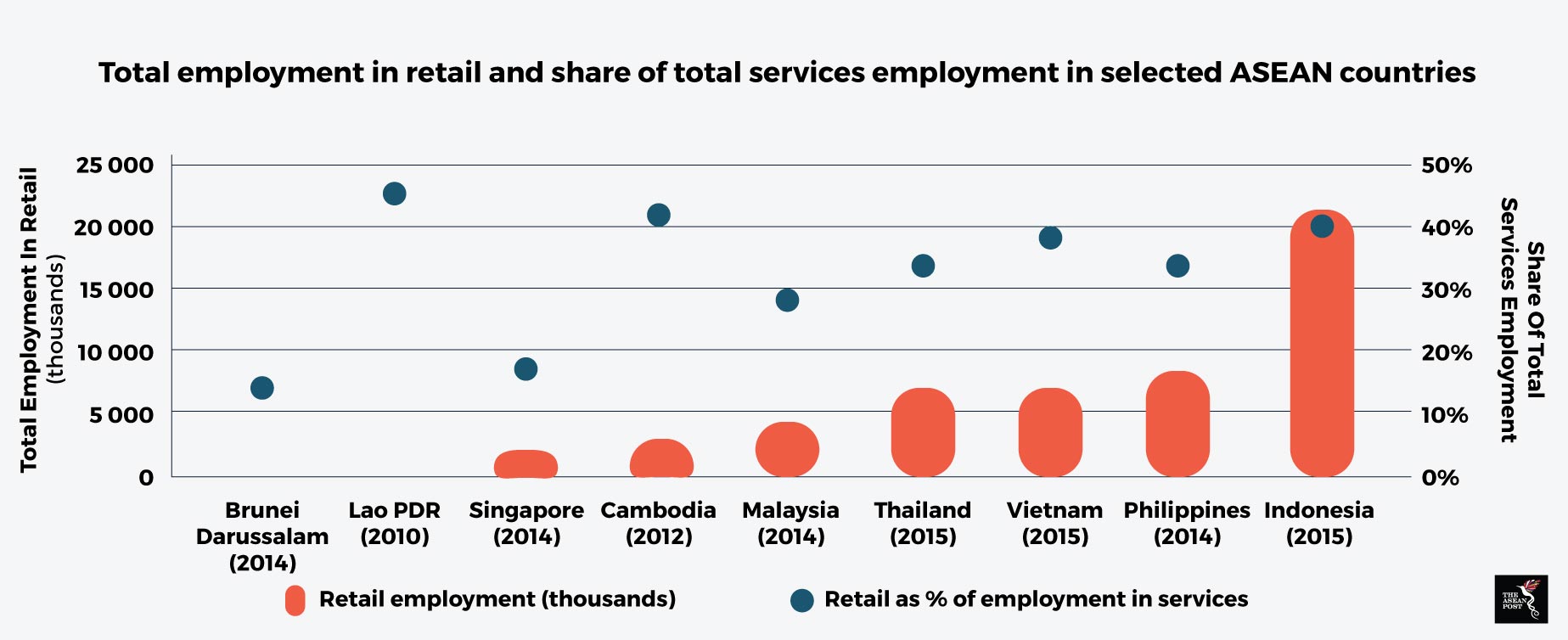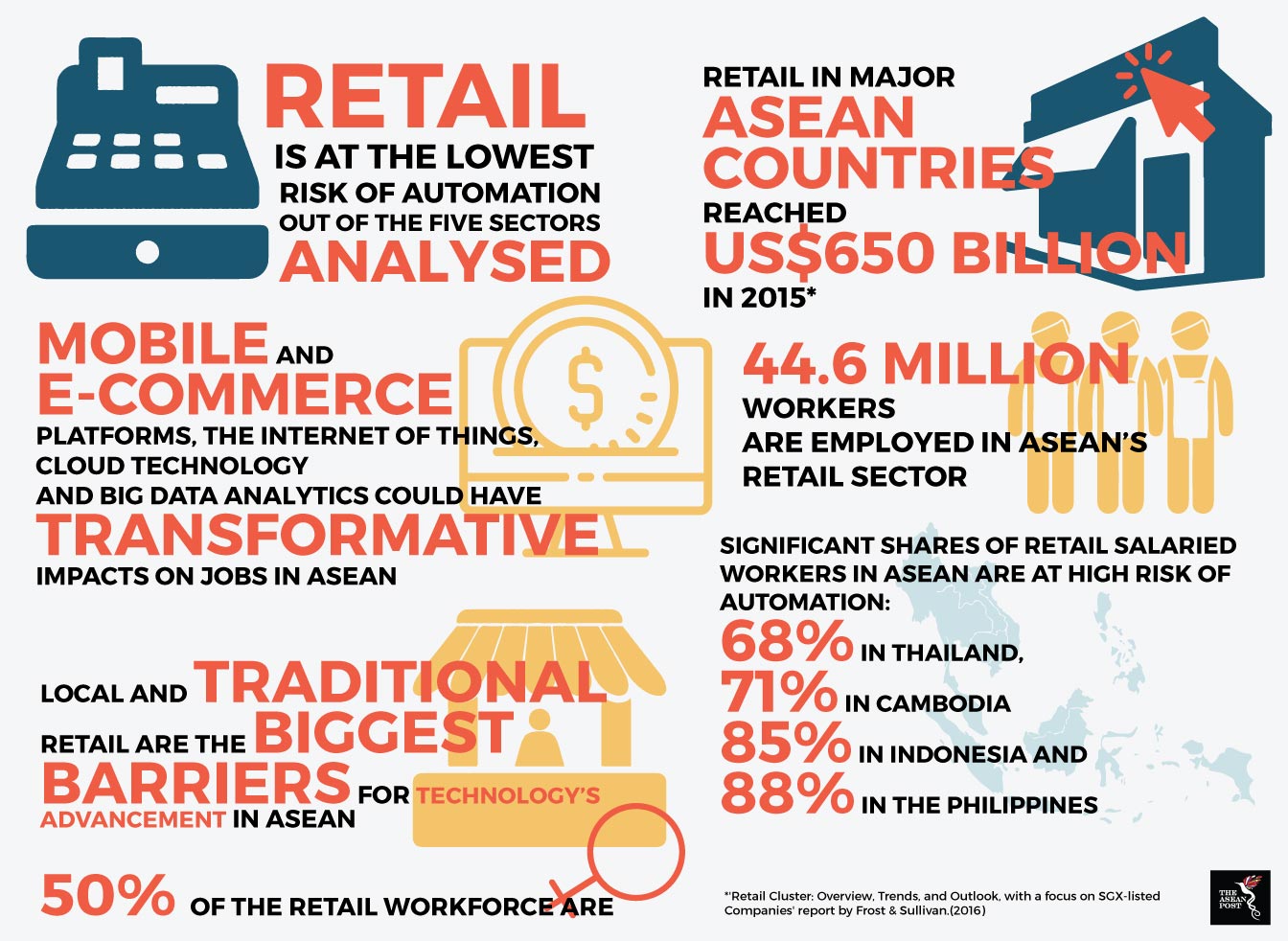The retail sector accounts for the largest source of employment in the Southeast Asian region. According to the International Labour Organization (ILO), it employs an aggregate of 44.6 million workers, which represents 16 percent of the region’s total employment. This sector is definitely nowhere near saturation, instead it is projected that the major ASEAN countries alone will contribute to US$1.3 trillion in retail sales this year.
With new developments in technology happening at a rapid pace, challenges will be felt throughout the entire workforce. The establishment of automation as envisioned in the dawn of the Fourth Industrial Revolution will see jobs in various sectors being displaced.
Luckily for the retail sector, ILO’s 2016 ‘ASEAN in Transformation: How Technology Is Changing Jobs and Enterprises’ report states that ASEAN’s retail industry will be the “least threatened” by future technologies. However, the use of disruptive technologies such as mobile and e-Commerce platforms, the IoT, cloud technology, and big data analytics are still yet to be expanded in the region.

Source: ASEAN in Transformation: How Technology Is Changing Jobs and Enterprises (2016)
Challenges for ASEAN
In theory, mobile and e-Commerce platforms would be able to supersede many of ASEAN’s more conventional retail systems. With the mentioned technologies, products and services can be sold online at cheaper prices, without the worry of rent and logistical expenditures. Especially with rising overhead expenses, the Internet infrastructure becomes more appealing to vendors.
Currently, e-Commerce makes up a very low share of the ASEAN retail market, which is less than 1 percent of all sales regionally. The ILO report also states that this is due to the ASEAN consumer behaviour of not trusting online and mobile shopping. It is also said that more traditional vendors such as wet markets, street retailers and hypermarkets remain popular amongst consumers in the region.
The use of cloud technologies, big data analytics and the Internet of Things (IoT) would improve enterprise operations, which are now being handled by employees in the retail sector. Some examples are effective product tracking, shopping intelligence and optimising inventory management.
Big data analytics will be an important technology that offers a great deal of potential as it will aid in monitoring customer behaviour, prediction of consumption trends and price forecasting.
“There is a great deal of untapped data for retailers coming from social media, customer feedback comments, video footage, and global positioning system (GPS) data that could be churned into useful business insights,” the report added.

Source: ASEAN in Transformation: How Technology Is Changing Jobs and Enterprises (2016)
Skill enhancement
With the introduction and use of these advanced technologies in the retail sector, employees would also need to be equipped with new skill sets. Two important ones would be digital marketing skills and social media skills. Employees would need to familiarise themselves with the various apps and websites that consumers use to help them make purchasing decisions.
The report also mentioned the need for soft skills. Despite the rise in use of technology, many consumers are often frustrated with the automated customer service they experience and still desire a human touch. Hence, employees and retailers can improve on time management, problem solving, and interpersonal communication that can affect output and job performance.
Apart from that, employees need to have more in-depth product knowledge as well. Due to the large amount of information available on the Internet, the convenience of shopping, as well as the ability to compare prices online, consumers expect retail employees to know more about a specific product than they do.
Shift in focus
While technology advancements continue to take place, ASEAN nations need to adapt fast. Inevitably, overall retail sector employment will decrease but those workers with technical data management skills will continue to be in great demand.
It is also imperative to note that the retail sector’s customer base is not only limited to the regional population but also includes business travellers and tourists. Since tourism is an important sector for the ASEAN region, a more service-oriented and highly trained retail labour force will be key to help the sector grow to its fullest potential.
Recommended stories:
